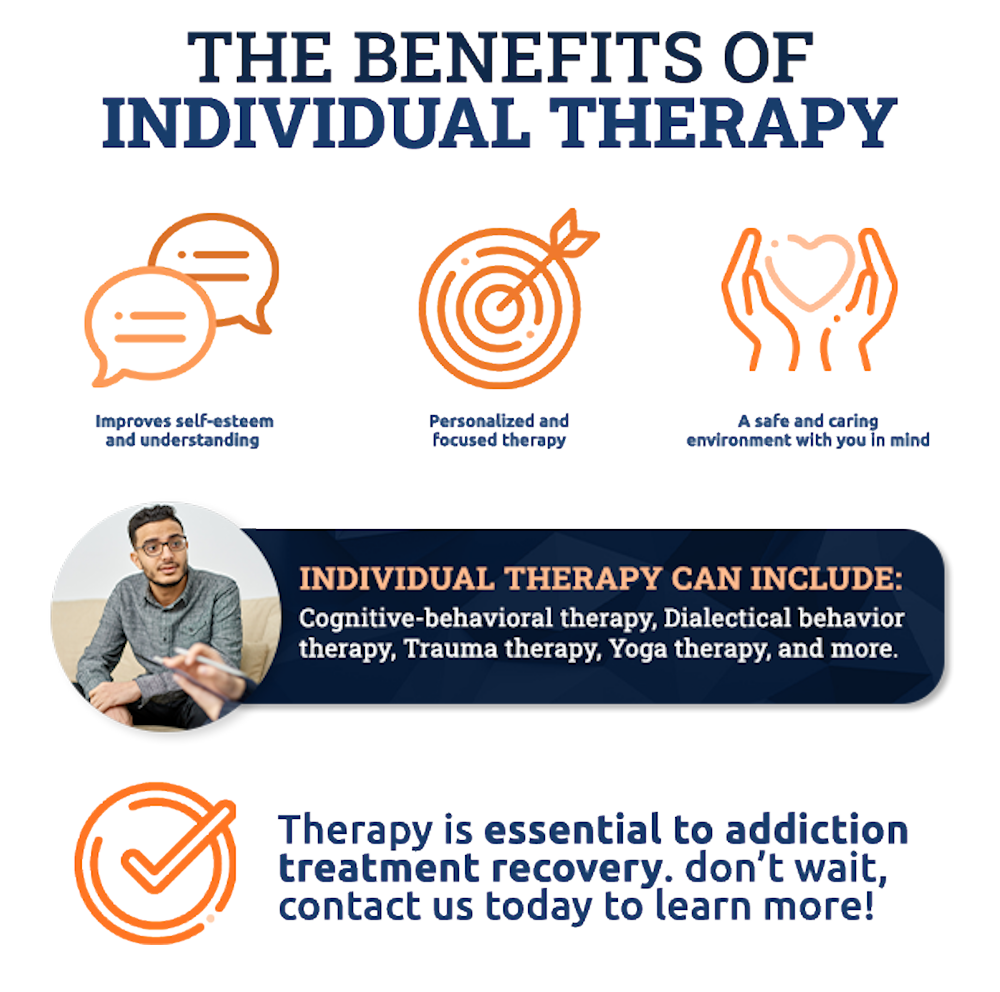One of the essential parts of successful drug rehab treatment is implementing a supportive individual therapy program. Throughout the addiction therapy services Northern Illinois Recovery Center offers, it is crucial to address your thoughts, feelings, and emotions. For many, this means working in a one-on-one environment with a counselor or therapist to identify, explore, and learn how to address issues impacting mental health and substance use disorder. An individual therapy program plays a significant role in your individualized treatment. An individual therapy program also ensures that you can open up about how you feel and address past, present, and future concerns.
Characteristics of an individual therapy program include:
- Individual counseling and one-on-one therapy
- Evidence-based therapy techniques
- Licensed therapists
- A safe environment free from judgment
- Providing individualized care for your specialized needs
About Individual Counseling for Substance Abuse and Mental Health Treatment
For many, working one-on-one is the best way to develop trust and improve one’s communication skills. In individual therapy, you’ll learn techniques and skills to help you address, avoid, and overcome triggers. Clients also learn healthy coping mechanisms that they can practice outside of therapy. As clients progress, they learn more about themselves and others as treatment is adjusted to meet their changing needs.


How Can Individual Counseling Help Co-occurring Disorders?
At Northern Illinois Recovery Center, our dual diagnosis treatment center in Illinois was designed to provide the specialized care needed for co-occurring disorders. Through individual counseling, evidence-based therapies, and ongoing support, we help clients achieve sobriety while improving their mental health. If you or a loved one is struggling with addiction and a mental health disorder, reach out today to learn how our personalized treatment can help you reclaim your life.
Individual Therapy vs Group Therapy
Individual therapy sessions can provide an intimate setting for patients to address their mental health. Talk therapy is a wonderful tool with a deep history of tackling behavioral health. Social workers can also perform therapy services. Group therapy services are effective in introducing multiple perspectives from group members. Socialization skills are quite important for those in recovery because those with mental health issues tend to isolate or are misunderstood. Group therapy may not be suited for everyone; for example, someone may feel more comfortable in individual sessions to discuss topics such as sexual orientation.
Individual Therapy and Addiction Treatment
- Cognitive-behavioral therapy
- Dialectical behavior therapy
- Family therapy
- Group therapy
- Yoga therapy
- Trauma therapy
Changing your lifestyle and deciding to stop using drugs and alcohol is stressful and, at times, overwhelming. Therapy through individual sessions helps you deal with those feelings and creates a healthy outlet for you to express your emotions. If you struggle with trauma, therapy can help you navigate painful past experiences while working on your recovery from addiction.
What Can I Expect from Individual Therapy Sessions At Northern Illinois?
Your individual therapy session will likely depend on the type of therapy you choose. At Northern Illinois Recovery Center, we offer the following forms of individual therapy:
Cognitive-behavioral therapy is one type of individual counseling. This therapy focuses on how your thoughts, feelings, and behaviors are interconnected. The therapists specialize in techniques to help patients identify negative thought patterns and replace them with positive ones.
Dialectical behavior therapy (DBT) is a type of individual counseling that is often used to treat borderline personality disorder. This type of therapy focuses on helping you regulate your emotions and change behaviors that are harmful to yourself or others. DBT teaches valuable coping strategies for stress and helps individuals learn how to identify and discuss their emotions.
Family therapy is a form of therapy that is used to treat mental health conditions that are impacting the whole family. A family can be a central tenant for mental health wellness. Family involvement can drastically impact a person’s recovery, especially for children and young adults. This type of therapy helps families focus on communicating better and resolving conflicts. Family therapy can be used to treat conditions such as addiction, mental illness, and behavioral problems.
Group therapy is a type of therapy that is used to treat mental health conditions. In group therapy, you will meet with a group of people who are also struggling with similar issues. The therapist will lead the group and provide support. Group therapy can be helpful for conditions such as addiction, depression, and anxiety.
Yoga therapy is a type of therapy that uses yoga to treat mental and physical health conditions. Yoga is part of our holistic therapy approach used to treat conditions such as anxiety, depression, and chronic pain. It helps address physical wellness alongside mental health while also helping patients practice mindfulness and relaxation techniques.

What are the Benefits of Individual Counseling?
- Personalized Support: Therapy is tailored to the individual’s unique needs, allowing for focused attention on specific concerns and goals.
- Emotional Healing: It provides a safe environment to process past traumas, reduce emotional pain, and develop healthier coping mechanisms.
- Improved Self-Awareness: Through self-reflection and guided discussions, individuals gain deeper insight into their thoughts, behaviors, and relationship patterns.
- Enhanced Coping Skills: Therapists teach practical strategies to manage stress, anxiety, depression, and other mental health challenges effectively.
- Increased Confidence: As individuals work through their struggles and achieve personal growth, they often experience greater self-esteem and resilience.
- Better Relationships: Therapy helps individuals develop healthier communication and boundary-setting skills, leading to more fulfilling connections with others.
- Goal Achievement: A therapist can help clients clarify their objectives, break them into manageable steps, and stay accountable in their personal or professional growth.
By addressing mental and emotional well-being in a structured way, individual therapy empowers people to lead more balanced and fulfilling lives.

How to Build a Relationship with Your Individual Therapy Counselor
Here are a few tips for building a trusting relationship with your therapist:
- Be honest with your therapist.
- Be open to feedback from your therapist.
- Follow through with homework assignments from your therapist.
- Communicate openly and honestly with your therapist about how you’re feeling.
If you are considering individual counseling, it is important to find a therapist you feel comfortable with. Ask friends or family members for recommendations or do some online research. Additional resources may be available through your school or workplace. It is important to find a therapist who specializes in the type of counseling you need.
Frequently Asked Questions about Individual Therapy
Yes, it’s often encouraged to combine individual therapy with other treatments, such as motivational interviewing, holistic therapies, and medication management. These can supplement individual therapy programs to help ensure their efficacy and address individuals as a whole instead of focusing on one aspect of their condition.
Telehealth is a growing field in mental health. It is the use of technology to provide mental health services remotely. This can include talk therapy, counseling, and psychiatry. Telehealth therapy is a way to provide mental health services to people who may not be able to get them otherwise, such as those living in rural areas. It’s convenient for the patient and the therapist as the patient does not have to leave home to get help. This also makes it easier to schedule and attend appointments.
To prepare for your first session, consider what issues and topics you’d like to discuss with your therapist. Your first therapy session will likely revolve around introducing yourself to your therapist and sharing both short- and long-term goals for therapy. It’s important to be comfortable, so be sure to ask any questions you have about the process. Therapy can be a slow process, as it takes time to build trust with your therapist and recognize habits. Be patient and open to ensure the best results from your sessions.
Therapy sessions are typically 50 minutes long, though this can depend on the type of therapy you receive. Individual therapy often takes several sessions throughout several months to ensure patients learn new coping strategies and thought patterns. Some individuals even attend therapy sessions for years to help maintain their mental health.
The costs associated with individual counseling programs vary depending on the therapist’s location and experience, as well as your insurance coverage. However, most individual counseling programs range from $50 to $200 per session. Some therapists may also offer a sliding scale fee, which means that their rates will be based on your income. It’s important to ask about fees before you begin therapy.
Insurance typically covers a certain number of counseling sessions. At Northern Illinois Recovery Center, we work in-network with several insurance companies. We offer free insurance coverage verification to ensure you understand the costs of your therapy program.
Are You Struggling with Substance Abuse or Addiction Issues?
Choosing a rehab that understands your needs and offers programs that utilize evidence-based approaches can be difficult. If you’re ready to get started, call Northern Illinois Recovery Center today. Our facility has the experience, training, and knowledge to help you recover from addiction with an individual therapy program.






